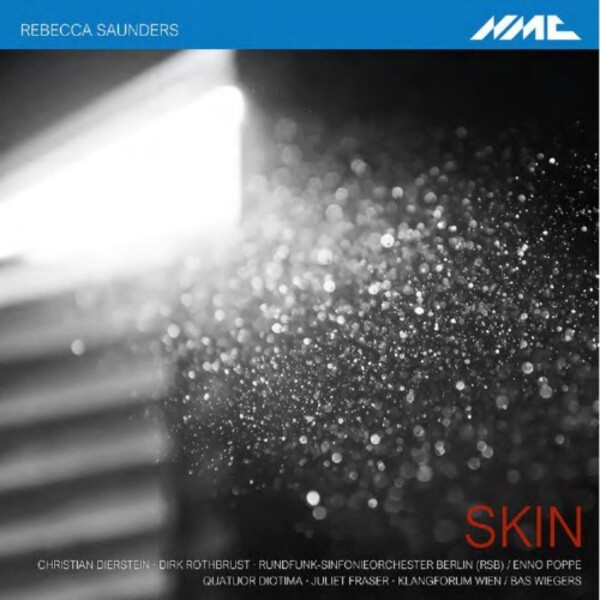
R Saunders - Skin
£13.25 £10.60
save £2.65 (20%)
special offer ending 27/05/2024
In stock - available for despatch within 1 working day
Despatch Information
This despatch estimate is based on information from both our own stock and the UK supplier's stock.
If ordering multiple items, we will aim to send everything together so the longest despatch estimate will apply to the complete order.
If you would rather receive certain items more quickly, please place them on a separate order.
If any unexpected delays occur, we will keep you informed of progress via email and not allow other items on the order to be held up.
If you would prefer to receive everything together regardless of any delay, please let us know via email.
Pre-orders will be despatched as close as possible to the release date.
Label: NMC Recordings
Cat No: NMCD263
Format: CD
Number of Discs: 1
Release Date: 18th November 2022
Contents
Artists
Juliet Fraser (soprano)Christian Dierstein (percussion)
Dirk Rothbrust (percussion)
Quatuor Diotima
Klangforum Wien
Rundfunk-Sinfonieorchester Berlin
Conductors
Bas WiegersEnno Poppe
Works
SkinUnbreathed
void
Artists
Juliet Fraser (soprano)Christian Dierstein (percussion)
Dirk Rothbrust (percussion)
Quatuor Diotima
Klangforum Wien
Rundfunk-Sinfonieorchester Berlin
Conductors
Bas WiegersEnno Poppe
About
The focus of much of Saunders's music is on the delicate balance between sound and silence, and none of her works explore this more vividly than void (2013-14) for percussion duo and orchestra. Composed for Christian Dierstein and Dirk Rothbrust after a number of "exploratory sound sessions" together, the two percussionists are positioned in front of the Rundfunk-Sinfonieorchester Berlin (RSB) conducted by Enno Poppe, playing aluminium flower pots and rin (Japanese singing bowls) into the 'void' created by the orchestra. Saunders repeatedly returned to the final short prose of Samuel Beckett's thirteen Texts for Nothing (1947-52) when completing void, inspired by how the text's "intensely fragile fleeting moments, describing a mouthless murmuring ceasless voice, are juxtaposed with violent outburts of anger."
Beckettian expression was also part of the pool of influences behind Unbreathed, a string quartet written for Quatuor Diotima in 2017. Premiered at the Wigmore Hall in 2018, not long after the composer's fiftieth birthday, Unbreathed is only the second string quartet written by Saunders after 2012's Fletch. The work plays with ideas of remoteness and negation, exploring the materiality of sound in a way only Saunders's music can. But the collection of precise sonic events that comprise Saunders's composition is anything but sterile; she is fascinated with the grit and noise involved in producing sound, those extramusical elements that remind us of music's humanity.
The title of the third work on the album – and also the title of the album itself – invokes this tactility, describing "the delicate membrane seperating the body and its environment" (Saunders). Composed in 2015-16 for Juliet Fraser and Klangforum Wien, Skin is the first of Saunders's works with a sung text, her previous vocal works having explored the voice purely timbrally. The text is Saunders's own, materialising gradually throughout the compositional process, partly inspired by collaborative sessions with solo soprano Juliet Fraser, and partly by literary references such as the close of Molly Bloom’s monologue from James Joyce’s Ulysses, and once again, prose by Beckett. The solo part is hugely virtuosic – in the liner notes Paul Griffiths describes how "the work stretches its soprano protagonist across the feverishly alive body of instrumentalists. She is this music’s skin. Voice is this music’s skin."
Rebecca Saunders is in great demand as a composition tutor and teaches regularly at, amongst others, the Darmstadt Summer Courses and the Impuls Academy in Graz. Her compositions have been recognised with numerous prestigious international awards, including the 2019 Ernst von Siemens Music Prize (often described as the Nobel Prize of Music).
Reviews
 Brilliantly sculpted textures, sometimes intensely fragile, sometimes furiously wrought, show Rebecca Saunders to be one of the leading figures of European music today.
Brilliantly sculpted textures, sometimes intensely fragile, sometimes furiously wrought, show Rebecca Saunders to be one of the leading figures of European music today.Error on this page? Let us know here
Need more information on this product? Click here